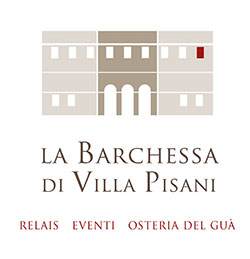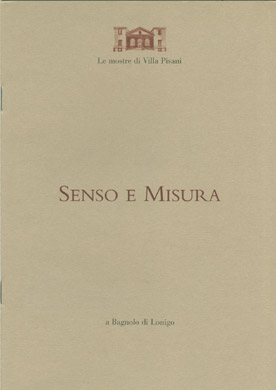SENSO E MISURA
Ci sono luoghi che determinano quasi obbligatoriamente gli eventi,
e che fanno sì in modo del tutto naturale che certe cose
possano accadere. Non altre, solo quelle. Ciò avviene nel caso
dell’arte, soprattutto dell’arte contemporanea, proprio per quello specifico,
magico incontro che si determina nel caso di un appuntamento espositivo,
in cui nelle occasioni riuscite si viene a determinare una necessità
per cui quelle opere si devono per forza trovare lì, e proprio lì ha finalmente
luogo quello scambio sia dialettico che poetico fra l’arte ed il contesto
(nel caso presente, tutto culturale) che, unico, permette di approfondire
anche – non solo – il senso della storia, quindi il senso del presente.
È il caso di questa mostra, il cui titolo Senso e Misura permette di coniugare
insieme le caratteristiche calibrate di armonia ed equilibrio del
Palladio in questa sua magnifica Villa Pisani, insieme alle opere degli
artisti qui per la prima volta esposte. Ciò secondo una vivace molteplicità
di registri che non sono soltanto formali – per le ovvie diversità linguistiche – e non sono soltanto interni alle opere stesse, per quanto lo
slittamento dall’una all’altra sia agevole per motivo di più consonanze.
Si stende in tal modo di fronte agli occhi (ai sensi del visitatore) un
fronte assai articolato all’insegna di due indicazioni che risultano appieno
quando intese nella loro assoluta classicità, ovvero per quell’equilibrio
tutto interiore che assolutamente si ritrae dalla quotidianità della cronaca,
fornendo anzi indicazioni per temi ben più complessi che si vedono
legati alla coscienza, alla consapevolezza, al senso (al senso del tutto, ma
anche al senso dei sensi, verrebbe da dire in maniera un po’ ridondante),
come pure alla materia, e le sue diverse consistenze.
Quindi i termini di “genesi”, come pure di “assoluto” che più volte,
da più voci sono stati usati a proposito delle ricerche di Manuela
Bedeschi, Igino Legnaghi, Claudio Olivieri, Sergio Sermidi,
Rita Siragusa ben si prestano ad indicare contemporaneamente il versante “alto” della forma, come della “luce”, che saranno da intendersi
allora nei termini del divenire, del farsi stesso della forma, in termini
così di equilibrio che di esso la visione – che solo in apparenza sono
opposte –, che di profondità.
Forma, significato: semplice.
Magari lo fosse, perché su questi termini si gioca l’arte contemporanea,
la storia dell’arte tutta. Figurarsi!
L’incontro dei cinque artisti appena ricordati ha origine sì anche per
via amicale (la quale si dà magari da lunga data), ma certo non si dà per
caso, trovando ancor più come stupendo referente fisico, soprattutto culturale
come già detto, le spazialità, la “disposizione” dellaVilla Pisani.
Come più sopra, per questa specifica occasione i nomi sono venuti
quasi spontaneamente, diciamo per intima necessità.
E la loro presa sull’oggi è fortissima, proprio per via dell’alta raffinata
qualità delle opere.Non può essere diverso, pena il “politicamente corretto”,
con quel di piagnisteo – “vorrei ma non posso” – che si tira dietro.
Sono nel nostro caso soprattutto l’equilibrio, la compostezza, il senso
della forma (da leggersi come tale anche e soprattutto nel suo stretto rapporto
con la luce) a dare effettivo vigore ad argomenti che possono anche
essere, perché no,metafisici (la consistenza della carne, la spiritualità,
la visione, ed è bene che laicamente se ne discuta, soprattutto nelle arti)
ma che nel loro insistere continuo sulla coscienza intervengono (possono
intervenire) anche nell’ambito della vita quotidiana, possibilmente in
ultimo – dài e dài – nei comportamenti.
Per quanto in condizione di lateralità, compito precipuo delle arti è
infatti proprio quello di insistere mentre l’umanità dorme: allora, in una
sequenza che non è solo poetica (ma in maniera ben più fresca e rispettosa
nei termini, di struttura linguistica delle arti visive) si legano in
Senso e Misura, in maniera forte negli artisti, il colore-luce, la luce-struttura,
la struttura-colore, infine l’architettura-luce, grande serbatoio linguistico,
e risultano quasi misurabili, negli spazi ospiti dellaVilla Pisani,
assolutamente, perfettamente accentati ogni volta nei dipinti, come nelle
sculture presentate in mostra, che parlano la nostra lingua, le nostre emozioni,
le nostre vite. Le vite di oggi, non di ieri.
Il “senso e la misura” di Manuela Bedeschi, di Igino Legnaghi, di
Claudio Olivieri, di Sergio Sermidi, di Rita Siragusa scartano dall’ovvietà
schiacciata dall’immediato – anche biografico, che non interessa
in arte – per ribadire le ragioni dell’arte appunto, che sono tutte umane
e fondamentali nel corso di quella ricerca dell’origine (che è dell’universo,
della vita, dei sensi a tutti comuni) la quale è alla base del concetto
di identità, vero nodo scottante.
La tensione della materia si lega alla tensione verso l’assoluto, la visione
diviene tangibile – verificabile – e finalmente umana, una volta
di più, rapportata allo sforzo che quotidianamente si compie su queste
non sempre amare sponde. I mezzi espressivi, direttamente pittura, direttamente
scultura, assumono in sé le massime significazioni della materia
ribadendo la questione primaria ed appassionata del sentimento
(che, da quanto scritto fino ad ora, procede nel nostro caso insieme alla
misura, senza debordare): tutto ciò conferisce valore pieno ai valori
(le singole storie) formali di ogni singola opera, quindi ancor più apprezzabili
per le loro caratteristiche di significato ed emozione invece
che come intellettualizzato fenomeno di stile.
Giandomenico Semeraro.

Events are virtually obliged to occur in certain places, places
that ensure they happen in a most natural way.This is the case
with art, above all contemporary art, when that magical yet
specific meeting-place we call an exhibition takes place.When a show
is notably successful those works in particular are on show out of
necessity. It is there that the dialectic and poetic exchange between art
and its context (a cultural one in the present instance) finally takes
place and permits, amongst other things, the unique possibility of
delving into the sense of history and, therefore, into the sense of
the present.
This is the case of the present exhibition. Its title, Sense and Measure,
hints at the possibility of balancing the characteristics of Palladio's harmony
and equilibrium, as seen in his magnificentVilla Pisani, with the
works of the artists on show here for the first time.This can happen on
various levels, not just formal ones - due to the obvious linguistic differences
- and not just within the works themselves, but also as a result
of the easy movement between the two.
So the visitor has in front of his eyes (and his senses) a highly articulated
vision of two possibilities that are fully realised only when they
are appreciated for their absolute classical qualities, in other words for
that wholly interior balance that detaches them from daily concerns.
In fact this involves far more complex interests that are linked to conscience,
awareness, sense (to everybody's sense as well as to the sense
of everybody, I am tempted to say at the risk of overstatement), as well
as to material and its varying consistency.
It follows that the terms 'genesis' and 'absolute', so often used by
various critics about the work of Manuela Bedeschi, Igino Legnaghi,
Claudio Olivieri, Sergio Sermidi, and Rita Siragusa, are well adapted
to indicate both the 'high' aim of their forms and their 'light', which
should be understood as terms for 'becoming' and for the creation of
form, both for their equilibrium and for the vision we have of them -
which are only apparently opposed - as well as for their depth.
Form, meaning: simplicity.
If only this were so, because it is in these terms that we must discuss
contemporary art and even the history of art in general.
The grouping together of these five artists originated, of course, partly
out of friendship (which in certain cases dates back quite some time).
There is, however, certainly nothing casual about it, above all when seen
in the context of such a marvellous physical and, as I said earlier, cultural
reference point as the space and the 'layout' ofVilla Pisani.
For this particular occasion the names of the artists suggested
themselves almost spontaneously; I would even say it was the outcome
of an intimate necessity.
Their contemporary relevance is great, precisely as a result of the
highly refined quality of their works.And it could not have been otherwise
except at the cost of being 'politically correct' and of that selfpitying
'I would if I could' attitude that is part and parcel of it.
In the present case it is most of all balance, composure, and formal
sense (which includes above all the close relationship the works have with
light) that give real strength to inquiries that can also be considered - and
why not? - as metaphysical (the coherence of the flesh, spirituality, vision,
which the arts in particular should deal with without partisanship). But
their continuing persistence within our mind causes them to act on dai14
ly life as well; perhaps,when it comes down to it, even on our behaviour.
Even though not a central preoccupation, one of art's main tasks is,
in fact, to persist while humanity sleeps.And so, in a chain that is not
simply poetic (though in a far fresher and more respectful manner in
terms of linguistic structure), the artists present in Sense and Measure link
colour and light, light and structure and, last but not least, that great
linguistic reservoir of architecture and light. In the spaces ofVilla Pisani
these can almost be measured; time and again they are absolutely and
perfectly reflected in the paintings and sculptures in this show which
speak our language, express our emotions and our lives.The life of today,
not yesterday.
The 'sense and measure' of Manuela Bedeschi, Igino Legnaghi,
Claudio Olivieri, Sergio Sermidi, and Rita Siragusa signifies the elimination
of the banality of daily life (even in a personal sense: art is not
interested in biography) and replacing it with the motivations of art
which are all deeply human and basic to any inquiry into origins (of
the universe, life, the senses we all have in common) which, in turn, lie
at the heart of the concept of identity, the really important question.
The strain of the material links up with the strain towards the absolute:
vision becomes palpable, verifiable and, once again, finally human
in its relationship to the effort we are daily subjected to on this,
not always sad, earth.The paintings and sculptures embody in themselves
the deepest meanings of the material by confirming the primary
importance of feeling (which in this particular case goes hand in
hand with measure): all this gives force to the formal values (the individual
histories) of each individual work, and which are all the more
appreciable for their characteristics of meaning and emotion rather
than for being an intellectualised phenomenon of style.
Giandomenico Semeraro








